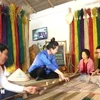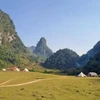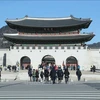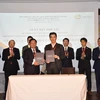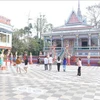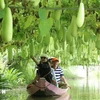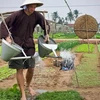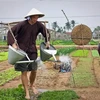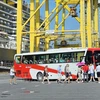In some parts of the Cuu Long (Mekong) Delta, one can see the amazing sight of westerners and other foreigners wading in swamps and mud, foraging for shellfish and picking waterlilies.
But not to many farmers in the area – not only are they used to this but also spread their arms to welcome these people into their homes .
With people getting increasingly tired of the hustle and bustle of urban life, the farmers are realising that the streams, farms, orchards, and backyard gardens, while commonplace to them, can be special to city-dwellers and earn them more than their crops.
Some farmers on Tiger Islet in the middle of the Hau River, one of the two main tributaries of the Mekong in Vietnam, have been offering their houses for homestay since the Central Association of Farmers embarked on an agricultural tourism project four years ago.
Although part of Long Xuyen, the capital of An Giang province, the islet continues to have a traditional farming lifestyle typical of the delta.
“We began to receive guests in 2009,” Nguyen Thanh Tung of the provincial association of farmers, who is in charge of executing the project in the province, said.
The project is funded by the Dutch Association of Farmers through its Vietnamese counterpart, receiving 8 billion VND (450,000 USD) in the first phase.
An Giang is one of three provinces chosen for the project – and the most successful – along with Tien Giang also in the delta and Lao Cai province in the north.
“ Agricultural life here [on the islet] has not changed much in hundreds of years,” Tung said to explain why the islet has been chosen as one of the province’s homestay destinations along with Tinh Bien district’s Tra Su cajeput forest where guests can sample ethnic Khmer culture.
The islet is characteristic of the delta’s riverine civilisation. The Mekong’s annual floods bring a wealth of fishes and sediments, and its inhabitants have long learned to adapt to life above the water.
All sorts of crops grow in its fertile soil – paddy, tropical fruits, vegetables. Then there are fish ponds, pigsties, and poultry in backyards while on a floating village in the middle of the river fish are farmed in underwater cages.
Homestay
While travelling along the peaceful, tree-shaded roads lined with stilt houses, guests can easily spot huge signs indicating the locations of hosts who take in homestay guests.
Tung, who said five households were chosen from 20 candidates, explained the selection criteria: “They should have adequate facilities for guests, reflect the southern agricultural lifestyle, and be enthusiastic about joining the project.”
Every family was provided 10 million VND (540 USD) to renovate bathrooms, raise passageways, and stock up on mosquito nets, blankets, and pillows.
Clean enough
“I was not really confident at first,” Ho Minh Quang, one of the farmer -hosts, said. “I kept wondering if the toilet is clean enough and the food matches foreigners’ tastes.”
He admitted to being at sixes and sevens when he first received foreign guests and said his family scrambled to do all kinds of things after they had arrived.
“Now we make preparations like decorating the house in advance,” he said.
But despite his new vocation, he still leads an essentially agricultural life. “I have not abandoned the fields inherited from my parents and grandparents. We will either hire people to share the work on the farm or just send guests to other households during busy periods.”
Picking fruits, watering vegetables, feeding fish, and fishing in rice fields submerged in waist-deep floodwaters are some of the activities guests can join in.
Although the islet is attracting tourists, it remains completely rustic with no large building that can accommodate dozens of guests or souvenir shops.
In an evaluation they did last October, Dutch experts praised the effectiveness of the project as evidenced by the number of guests and increase in the farmers’ incomes, Tung said, and pledged more funding this year.
“I have met lots of people from different parts of the country and the world, which has helped broaden my mind and improve my communication skills,” Quang, one of the five hosts, said when asked about the benefits from the project.
His income has risen by 40 to 50 percent, he added./.
But not to many farmers in the area – not only are they used to this but also spread their arms to welcome these people into their homes .
With people getting increasingly tired of the hustle and bustle of urban life, the farmers are realising that the streams, farms, orchards, and backyard gardens, while commonplace to them, can be special to city-dwellers and earn them more than their crops.
Some farmers on Tiger Islet in the middle of the Hau River, one of the two main tributaries of the Mekong in Vietnam, have been offering their houses for homestay since the Central Association of Farmers embarked on an agricultural tourism project four years ago.
Although part of Long Xuyen, the capital of An Giang province, the islet continues to have a traditional farming lifestyle typical of the delta.
“We began to receive guests in 2009,” Nguyen Thanh Tung of the provincial association of farmers, who is in charge of executing the project in the province, said.
The project is funded by the Dutch Association of Farmers through its Vietnamese counterpart, receiving 8 billion VND (450,000 USD) in the first phase.
An Giang is one of three provinces chosen for the project – and the most successful – along with Tien Giang also in the delta and Lao Cai province in the north.
“ Agricultural life here [on the islet] has not changed much in hundreds of years,” Tung said to explain why the islet has been chosen as one of the province’s homestay destinations along with Tinh Bien district’s Tra Su cajeput forest where guests can sample ethnic Khmer culture.
The islet is characteristic of the delta’s riverine civilisation. The Mekong’s annual floods bring a wealth of fishes and sediments, and its inhabitants have long learned to adapt to life above the water.
All sorts of crops grow in its fertile soil – paddy, tropical fruits, vegetables. Then there are fish ponds, pigsties, and poultry in backyards while on a floating village in the middle of the river fish are farmed in underwater cages.
Homestay
While travelling along the peaceful, tree-shaded roads lined with stilt houses, guests can easily spot huge signs indicating the locations of hosts who take in homestay guests.
Tung, who said five households were chosen from 20 candidates, explained the selection criteria: “They should have adequate facilities for guests, reflect the southern agricultural lifestyle, and be enthusiastic about joining the project.”
Every family was provided 10 million VND (540 USD) to renovate bathrooms, raise passageways, and stock up on mosquito nets, blankets, and pillows.
Clean enough
“I was not really confident at first,” Ho Minh Quang, one of the farmer -hosts, said. “I kept wondering if the toilet is clean enough and the food matches foreigners’ tastes.”
He admitted to being at sixes and sevens when he first received foreign guests and said his family scrambled to do all kinds of things after they had arrived.
“Now we make preparations like decorating the house in advance,” he said.
But despite his new vocation, he still leads an essentially agricultural life. “I have not abandoned the fields inherited from my parents and grandparents. We will either hire people to share the work on the farm or just send guests to other households during busy periods.”
Picking fruits, watering vegetables, feeding fish, and fishing in rice fields submerged in waist-deep floodwaters are some of the activities guests can join in.
Although the islet is attracting tourists, it remains completely rustic with no large building that can accommodate dozens of guests or souvenir shops.
In an evaluation they did last October, Dutch experts praised the effectiveness of the project as evidenced by the number of guests and increase in the farmers’ incomes, Tung said, and pledged more funding this year.
“I have met lots of people from different parts of the country and the world, which has helped broaden my mind and improve my communication skills,” Quang, one of the five hosts, said when asked about the benefits from the project.
His income has risen by 40 to 50 percent, he added./.
